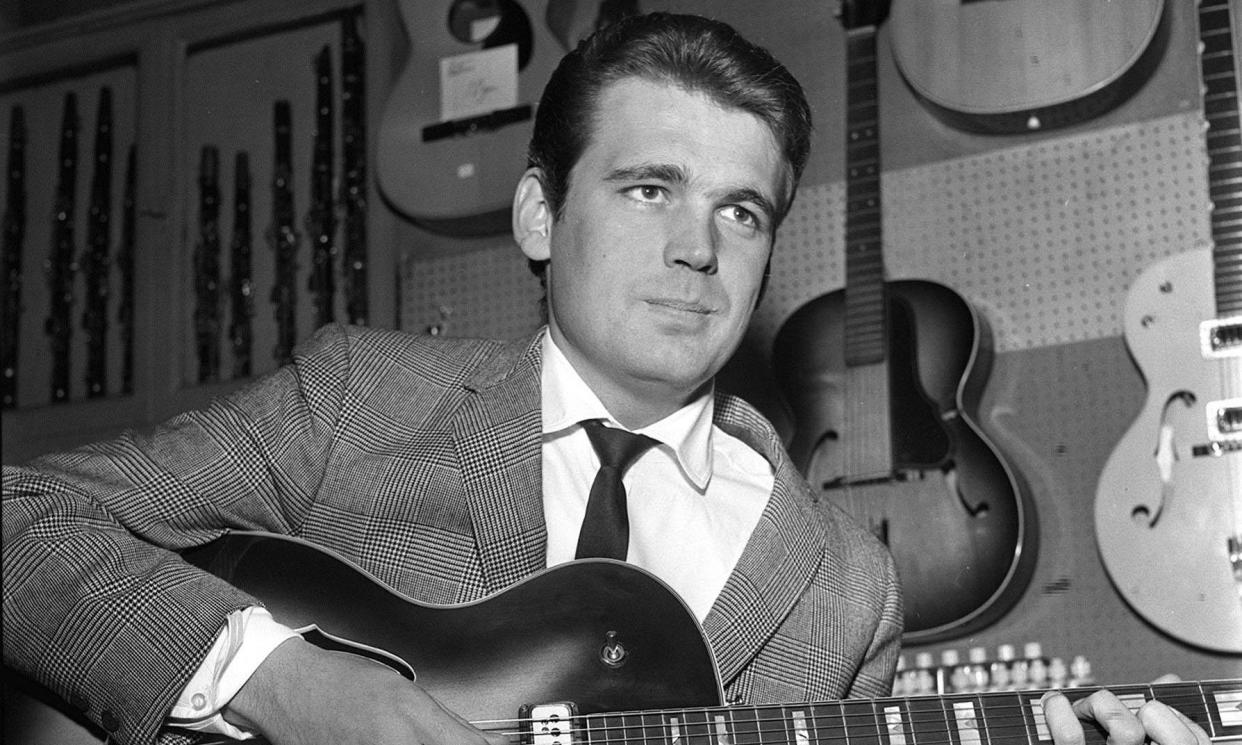Duane Eddy, pioneering rock’n’roll guitarist, dies at 86

Duane Eddy, the rock’n’roll guitarist who achieved solo stardom with a string of instrumental hits in the late 1950s and early 1960s, including Rebel Rouser and the theme to the TV series Peter Gunn, has died at the age of 86.
The Grammy-winning artist died of cancer surrounded by family at Williamson Health hospital near his home in Franklin, Tennessee, his wife Deed Abbate told the Associated Press.
“Duane inspired a generation of guitarists the world over with his unmistakeable signature ‘Twang’ sound,” a representative said in a statement. “He was the first rock and roll guitar god, a truly humble and incredible human being. He will be sorely missed.”
With his distinctive sound of rhythm, hollers and hand claps, as well as a principle that the guitar’s lower strings sounded better on tape than its high ones, Eddy helped established a “twangy” rock’n’roll sound that inspired future guitarists from George Harrison to Bruce Springsteen.
He notched 16 top 40 singles between 1958 and 1963 – near single-handedly cementing the position of the rock’n’roll guitar star.
“Instrumentalists don’t usually become famous. But Duane Eddy’s electric guitar was a voice all its own,” said Kyle Young, chief executive of the Country Music Hall of Fame and Museum, in a statement to Variety. “His sound was muscular and masculine, twangy and tough. Duane scored more than 30 hits on the pop charts. But more importantly, his style inspired thousands of hillbilly cats and downtown rockers – the Ventures, George Harrison, Steve Earle, Bruce Springsteen, Marty Stuart, to name a few – to learn how to rumble and move people to their core. The Duane Eddy sound will forever be stitched into the fabric of country and rock & roll.”
Born on 26 April in Corning, New York, Eddy began playing guitar at the age of five. He began performing in local radio shows as a child, with a guitar style primarily shaped by the singing cowboys Roy Rodgers and Gene Autry, as well as musicians Les Paul, Chet Atkins and Merle Travis.
After moving to Arizona at the age of 13, Eddy linked up with a friend, Jimmy Delbridge, to perform in local shows. They were scouted by aspiring producer Lee Hazelwood, who went on to record Eddy’s first solo single, Movin’ n’ Groovin’, in 1957, when Eddy was 19. Hazelwood and Eddy developed the distinctive “twang” style, which Hazelwood later adapted for Nancy Sinatra’s smash 1960 hit These Boots Are Made for Walkin’.
Though his chart success waned during the British invasion in the mid-1960s, Eddy’s style had an immediate impact on up-and-coming musicians, including Harrison and Hank Marvin of the Shadows. His music stayed alive, however, through use in more than 30 movies and TV shows over years. He reached the charts as late as 1986, with a remake of his 1960 song Peter Gunn by the UK band the Art of Noise.
Eddy recorded over 50 albums during his lifetime, including reissues, the vast majority before his retirement in the mid-1980s. He was inducted into the Rock and Roll Hall of Fame in 1994.

 Yahoo News
Yahoo News 
